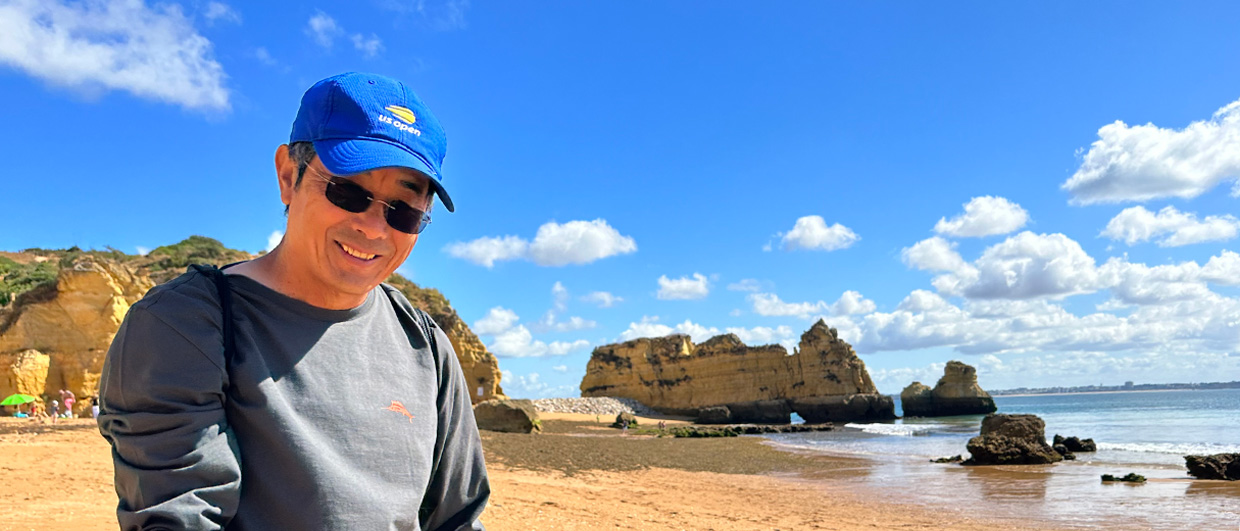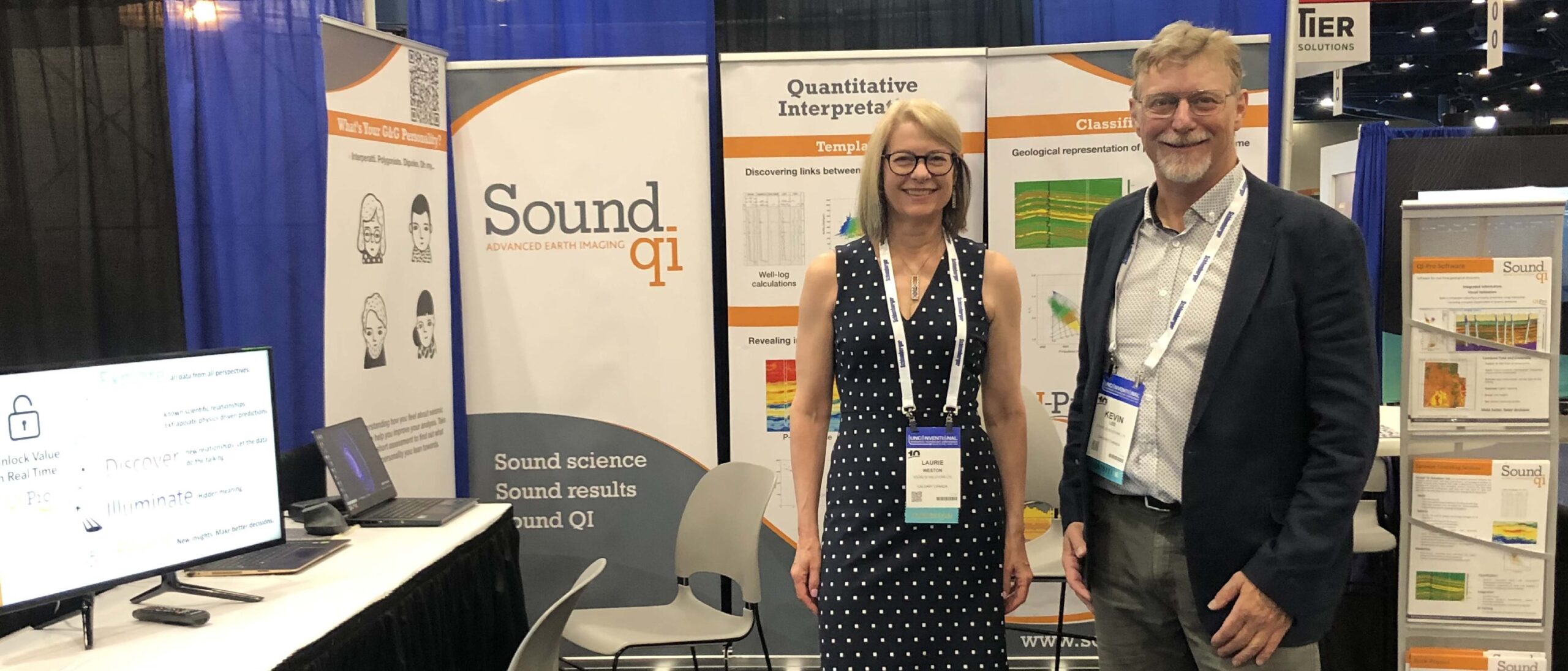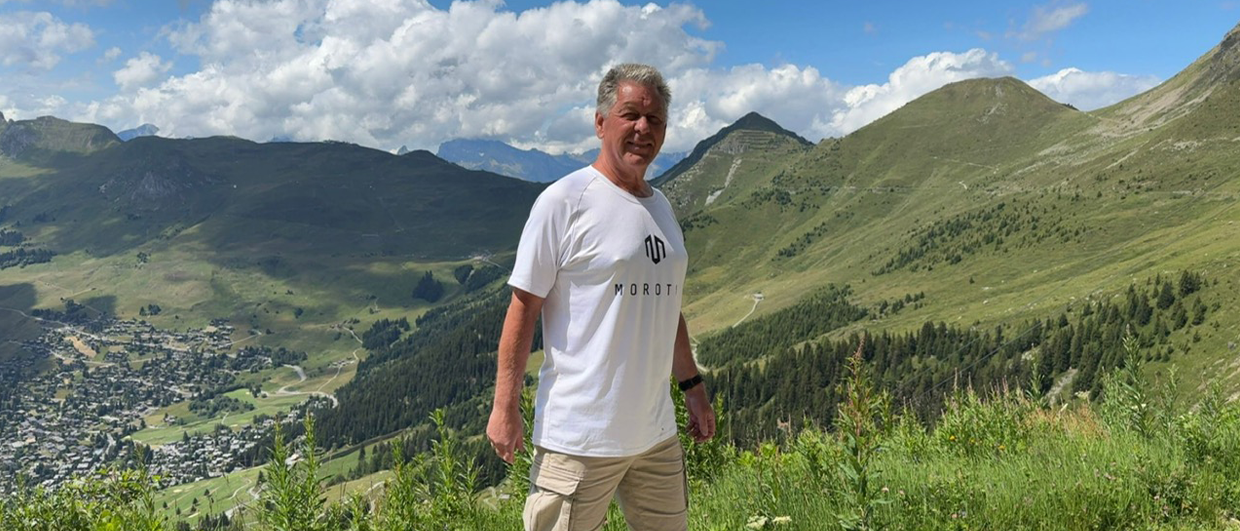After a career in industry, Prof. Mike Bowman moved to academia and is now Chair of Petroleum Engineering at the Qatari campus of Texas A&M University (TAMUQ) in Doha.
A career in industry and academe
Geologist Mike Bowman joined BP after completing a PhD and lecturing at the University of Wales.
During 30 years with BP he had a wide range of roles, from specialist geologist to senior manager, with postings to the US and Aberdeen and periods working in Egypt, Russia, Azerbaijan and Kazakhstan.
In 2011 he became Professor of Development and Production Geology at the UK University of Manchester, before moving to Qatar in 2015.
Image caption:
Good geologists know the importance of scale – Mike Bowman providing a suitable reference point at an outcrop of Eocene limestones west of Doha. (Source: M. Bowman)
How easy was the move from industry to academia?
I have really enjoyed the transition and the challenges it’s offered, as well as the contribution I feel I have made, initially at Manchester and now in Qatar. I retired in 2011 but I had always hoped to return to academia. Throughout my career I had tried to keep hands on and as technical as possible, even in my latter years as VP Geoscience for BP. Geology is my passion and combining this with what I had learned over many years in upstream E&P, I felt I had something to give back to help future potential petroleum geoscience and subsurface practitioners.
Fortunately, the University of Manchester felt the same way; I was offered a newly created Chair in Development and Production Geology, helping create a new Master’s degree in Petroleum Geoscience and supporting the development of a range of university-wide strategic initiatives. I’m very grateful to the university for the opportunity, which I really enjoyed – I still have an Honorary Chair there and teach some classes.
When and how did you get involved with TAMUQ?
The opportunity came out of the blue and was completely unplanned. My youngest son and his wife moved to Doha in 2015. When we visited them for a holiday they asked if we would be able to come over for extended periods if they were to start a family – Eloise is now 6 months old! I contacted a former colleague at BP, now a Professor at Texas A&M University, about giving a few talks at their new Qatar campus while I was in Doha. He put me in touch with the leadership there and the next thing I knew, I was offered the Program Chair in Petroleum Engineering. After some thinking (I hadn’t intended to work full-time again) I accepted and I am now in my second year here.
I’m really enjoying it. The leadership both here and in College Station (Texas A&M main campus) have given me enormous support. We have recruited new faculty staff and refreshed the curriculum, developing close links with both local industry and the regional education centers involved in subsurface teaching and research in the upstream O&G industry.
What brought Texas A&M to Doha; what do its programs cover?
Texas A&M university campus in Doha. (Source: TAMUQ)
The TAMUQ campus is located in Education City together with a number of other international campuses, each chosen to bring expertise and capability in a range of core areas of education and research that Qatar believes are essential for its future success. This is the vision of Sheikha Mozah bint Nasser Al Missned, second wife of Sheikh Hamad bin Khalifa Al Thani, former Emir of the State of Qatar.
Texas A&M was invited because of its world-class reputation in petroleum engineering, but we also offer programs in electrical, mechanical and chemical engineering, supported by liberal arts and science foundation programs, enabling a fully US-style undergraduate degree to be offered. It is an excellent, exciting working environment. The small campus – about 1,000 undergraduate students – means a really high quality relationship between faculty, staff and students.
The undergraduate programs are the same as those at the College Station campus, so our students get a fully-fledged engineering degree from Texas A&M – and the reputation that comes with this.
Is industry collaboration important?
Essential. Overseas campuses are here to create a sustainable high quality capability for the benefit of Qatar. Keeping this in mind and working closely with local industry to ensure that we deliver what they need are vital for success, because our graduating students will be taking jobs in these companies and our curriculum and research focus must be aligned to what industry needs.
I have spent a great deal of time building closer links and relationships with Qatar Petroleum, the other national operating companies such as RasGas and QatarGas and local IOCs here in Qatar, as well as service and consulting companies. We have a strong, supportive industry advisory board with leaders from local companies who advise and guide us and offer support ranging from site visits to teaching assistance and career guidance.
Overall, we have very good working relationships with our industry partners here in Qatar, and maintaining and growing these is a key to future success.
The Drilling Simulator lab, one of the top class teaching and research facilities at TAMUQ. (Source: TAMUQ)
What value do overseas campuses bring to their host country and what challenges do they face?
Overseas campuses offer local, in-country benefits and also broaden the perspectives of the home country campus. The key to success is effective leadership, organization and structure in the overseas campus to complement the imported curriculum. This demands high quality, dedicated faculty who deliver great teaching, research and service to the community. I believe that we have all of this at TAMUQ, which is why it is such a great place to work and is seen to be very successful from both local and home perspectives.
Making the strategic decision to set up an overseas campus is a major undertaking. The inaugural class of TAMUQ in September 2003 had 29 students, of whom 24 were Qatari and 15 were female. More than 600 engineers have graduated from Texas A&M at Qatar since 2007. Research activities addressing issues important to Qatar are valued at more than $196 million and include, among others, environmental concerns, advanced water treatment technologies, petroleum reservoir studies, modeling and simulation. All of this demonstrates just how successful it has been.
To build and maintain such a successful track record the new site must uphold the quality of the home base university and ensure a comparably high level of education for the local student body. These are not trivial undertakings, demanding continuous effort to set and maintain standards and to ensure comparability and compatibility in all aspects. I think the College Station and Qatar campuses of Texas A&M have worked hard and it has paid dividends; we have an excellent reputation locally and are seen as a core part of the education landscape here. However, you cannot stand still but must adapt to and foresee changing environments. The fall in oil and gas prices, for example, is putting pressure on locally available research funds. We are addressing these issues head on, working to attract the best students and building on the excellent track record of the last 13 years to shape a campus and program that meets future needs.
How do you like living in Qatar?
Mike Bowman and wife. (Source: M. Bowman)
My wife and I are really enjoying our time here in Doha. It is about the safest place in the world today, has great facilities and the Qatari people are generous, polite and welcoming.
Doha is an amazing city, possibly one of the fastest growing in the world today, with great things to offer in all dimensions from local culture to food and sport. It also feels a tremendous privilege to be playing a part in helping create a sustainable legacy and capability in the country. We both agree it was a great decision and is a great experience – helped by our new grandchild who brings an extra burst of sunshine with her smile.
Suggested reading from the GEO ExPro archive
The Qatar Oil Discoveries by Rasoul Sorkhabi
In January 1940, with the discovery of the onshore Dukhan oil field, Qatar joined the Middle East’s oil club. In 1960, Qatar’s first offshore field was discovered. Today, this country, smaller than the state of Connecticut, possesses the world’s third largest gas reserves, and about 25 billion barrels of oil. This article appeared in Vol. 7, No. 1
Doha – The Pearl of Qatar by Jane Whaley
Over the last 70 years, Doha has risen from the sands of the desert to become a major, glamorous regional power. This article appeared in Vol. 13, No. 5





